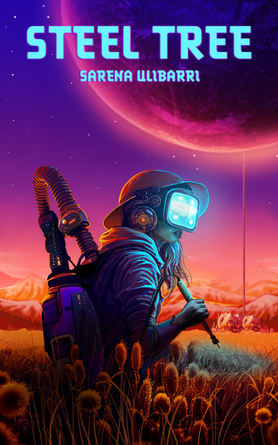 It’s ironic that I’ve published a Christmas book because… I don’t like Christmas. Or at least, I didn’t. For years, I would put my head down and suffer through the season, every festive jingle from retail speakers triggering negative associations. A few years ago, I worked through the roots of that negativity, some of which came from my own life, and some from generational trauma that has trickled down from my grandparents. I decided the best remedy would be to overwrite those negative memories with positive ones. To develop new traditions, rather than hold onto old ones I did not feel connected to. One of those new traditions, for me, has been The Nutcracker. If I saw it as a child, I have no memory of it, but my husband did, and he wants to see it every year. Our compromise was this: I would go with him every year, but we needed to see a different production each year, so the repetition wouldn’t become boring. We’ve seen some creative interpretations, including Nutcracker in the Land of Enchantment, which places the story in New Mexico and replaces the “Spanish Chocolate” ballet segment with authentic Flamenco dancers, and Nutcracker on the Rocks, which retells the story in a modern setting with rock music and hip-hop dance. It was during one of the more traditional shows, though, that I was struck with the idea for Steel Tree. When the inventor Drosselmeyer arrives at the Stahlbaum’s party, he first brings two life-sized dolls that dance stiffly before being carried off-stage. They’re robots, I realized! Or rather, automata, those windup predecessors from the 19th century, like from E.T.A. Hoffmann’s “The Sandman,” which I had read in grad school. As it turns out, the original story of The Nutcracker and Mouse King was also written by E.T.A. Hoffmann, and it is far more bizarre than the (already pretty weird) ballet. I searched for any versions which portrayed the Nutcracker as a robot who awakens to sentience. I found stories like Marissa Meyer’s Cinder, about a cyborg Cinderella, and Claire Legrand’s Winterspell, a dark steampunk take on The Nutcracker, but nothing that quite fit the story that I sketched out after that performance, which I unceremoniously titled “Nutcracker in Space.” Most of the positive memories I have of Christmas take place in Hawai’i. My grandparents lived there, and I was lucky enough to spend several winter breaks trading in a snowsuit for a swimsuit, and decorated pine trees for light-strung palm trees. The last time I visited before my grandmother passed, we toured of several coffee plantations. One of them had a huge processing factory, and the guide explained that smaller farms in the area brought their coffee beans there, and they all got mixed together and packaged under the larger farm’s label. This dynamic struck me as a good conflict for a story, and I held onto it, the way writers collect moments and images and names in a mental drawer like spare buttons. It was a couple of years later that I decided to put these two concepts together. What if instead of coffee, it was nuts, and in addition to the modern factory equipment, the farm had an agricultural android they called a “nutcracker”? The final piece that brought this story to life was Elon Musk’s absurd plan to offer “loans” to people who can’t afford to go to Mars, which would be worked off once they were on the red planet—a system that is indentured servitude in everything but name. These three ideas coalesced to become Steel Tree. Klara is one of those indentured servants—not on Mars, but on a pair of fictional double planets: Eta (named after E.T.A. Hoffmann, of course), and Petipa (named after Marius Petipa, the choreographer who first adapted The Nutcracker into a ballet). Klara runs the factory where the farmers bring their harvest, and the nutcracker androids package everything to be sent from Eta to Petipa—an arrangement that some think privileges Klara’s family over the rest of the farmers. In the ballet, her brother Fritz accidentally breaks the Nutcracker by playing too rough; in my version, her neighbor Fritz sabotages one of the nutcracker androids, accidentally causing the robot to “wake up” and gain self-awareness. I placed each of the familiar elements into this science fictional setting, borrowing from the structure of both the ballet and Hoffmann’s original, adding plenty of embellishments of my own. I hope that, whether you love or loathe the holidays, Steel Tree can bring a fresh perspective to an old tradition. Find Your Copy:
0 Comments
 Like a lot of writers, I have many random notes for story ideas, most of which go nowhere or sit in a notebook for years before they actually become a story. "Under a Rock" started as one of those: I had the idea of an inexplicable gigantic tooth showing up in someone's backyard, and them charging admission to see it, a la "A Very Old Man With Enormous Wings." I plucked the idea out of my notebook after seeing an anthology call that had something to do with sharks and dinosaurs; I decided the giant tooth I'd imagined could be a cosmic-sized version of either. After looking into the anthology a bit more, I discovered it was actually a revenge market, something put together to get back at/make fun of some other editor or author. These happen from time to time as manifestations of publishing world drama—the recent Cocktales and The Cocky Cockers anthologies which were reacting to the CockyGate "trademark" fiasco are prime examples. But considering I didn't know or have any stake in whatever this shark-related drama was, I decided to just be grateful for the prompt that helped me get this idea on paper, and submit it elsewhere. I wrote this story just after I quit my "day job," which I'd been working at the same time I took over management of World Weaver Press, and I was feeling pretty stretched thin and out of touch with the rest of the world. This was one of the first stories I'd written in nearly a year. All of that exhaustion and disconnection got poured into this story, the sense that remarkable things were happening all around me and I couldn't even look up to witness them. I guess "Working Like a Dog" and "Brain Child" have similar themes—I'm just not a writer who deals well with the drudgery we so often need to pay our bills. The character in this story ends up at home from her overbearing job because she's suffering from a cold. It was a convenient way to take her out of her element, but it was also an idea I'd been wanting to explore for a while. Protagonists are usually healthy and ready to run, or else they're suffering from some sort of severe trauma or disease. So much of my life has been spent in sniffles, or in not-great-but-not-fatal health, so I gave my character a cold to see how she'd face this adventure with a tissue in her hand. Here's an excerpt of "Under a Rock": A giant dinosaur tooth sat smack in the middle of our un-mowed back lawn. Truly giant: a good eight feet tall, and twelve or more from root to tip. Read the rest of the story at Silver Blade Fantasy Magazine: www.silverblade.net/2018/06/under-a-rock/

Guest Post by K.T. Ivanrest, author of the story "Lightless" in Equus, an anthology forthcoming July 18, 2017 from World Weaver Press
I seem to have a conflict problem. In the first draft of my Sirens story, "Threshold," there wasn’t enough conflict. In contrast, my early drafts of "Lightless" had too much. Below is a section of the first scene from an earlier version of "Lightless," and while I ultimately couldn’t make the fading/crime connection work with the rest of the story, I do like the extra tension it brought and wanted to share it (because what the world needs right now is more conflict, right? Right?...). (Note: because it’s an early draft, it’s not the best-edited excerpt you’ll ever read. Bear with me.) [Fulsa, locked in a tower with his slave Phaios, awaits the arrival of the empress.] He peered down at his hands, but could discern no difference in their glow. It was impossible, here in this prison with only Phaios for company, to tell whether there had been any more change, any further dimming. Beside the lightless slave he always looked radiant, so bright he could almost forget what was happening, and then the empress would arrive for her weekly visit and he would see the truth again. Her footsteps were soft tps on the polished stone stairway, her presence announced by the gradual spread of light that preceded her up the staircase, pressing away the shadows with proud disdain and careless ease. “Your Imperial Majesty.” He knelt as she ascended the last of the stairs, the silver fabric of her coat rustling softly on the stone, scattering specks of light like jewels for the less fortunate. “Fulsa.” Did she practice making his name sound like an insult, or did it just come naturally, a ready accompaniment to her anger and shame? “Another turn of the heavens. Are you, perhaps, finally prepared to make a confession?” For the briefest moment he considered saying yes, inventing an offense and apologizing and begging her to let him free. But of course it would do no good—the fading would continue and she’d know he had lied, and still she would not believe he’d done nothing. “No,” he said at last. Her eyes narrowed to slits, her fury flashing like her ever-present light. “You persist in lying to me. Every day you pale further into night and yet you continue to insist that you are innocent.” “I am. I’ve done nothing, I don’t know why this is hap—“ “Ridiculous,” she snapped. “I could overlook your crime, whatever it is, but your arrogance and dishonesty are unforgiveable.” She gave him a long, searching look, perhaps trying to decide whether arrogance and dishonesty were severe enough defects to cause someone to fade. But if that were the case, he thought bitterly, she would have faded long ago, and quiet, dependable Phaios would be sitting on the throne in her place. He shook his head and forced himself to meet her eyes. “I will not incriminate myself.” “Then we are finished.” She spun, the glass beads woven into her hair clicking as she moved. “Please.” He reached after her but dared not touch even her coat. “Please, is there nothing I can do or say to prove myself to you?” I want to go home. A long silence, pure and perfect like all the silence here in this desolate place, away from the city, from the stables and his team, from the thousands of citizens lighting the island with their glow. At last the empress spoke, voice hard as stone. “I will not visit again. When you are prepared to confess your crime, send word.” She strode forward and he leapt after her, desperate. “Wait, mother, plea—” By the time she’d spun again he was back on his knees, hot with shame, but the fire did nothing to increase his glow, which instead seemed to dim beneath the empress’ glare. “Look at you. Cowering like a lightless.” She turned once more and strode toward the staircase, and though he knew exactly what she was going to say next, it didn’t hurt any less to hear it. “You are no son of mine.” How does it compare to the final version of "Lightless"? You’ll have to read the story and see! </shameless plug>
K.T. Ivanrest wanted to be a cat or horse when she grew up, but after failing to metamorphose into either, she began writing stories about them instead. Soon the horses became unicorns and the cats sprouted wings, and once the dragons arrived, there was no turning back. When not writing, K.T. can be found sewing and drinking decaf coffee. She has a PhD in Classical Studies, which will come in handy when aliens finally make contact and it turns out they speak Latin.
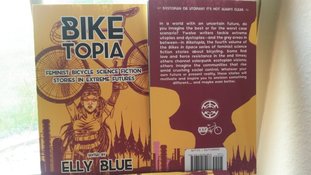
My contributor copies of Biketopia have arrived! Or, more accurately, I have managed to track down my contributor copies of Biketopia. See, my story "Riding in Place" was accepted for this anthology at the tail end of 2015, and I moved in the spring of 2016, and apparently forgot to update my address with the publisher. I realized this after it had been shipped. I considered using an expensive interception service, but figured the package would just be returned to sender and then resent to my new address.
Nope. Fortunately, for the first time in my life, I've only moved across town, and not across the country, so when I discovered the package had been delivered a week ago, I decided to go knock on the door of my old apartment. The new occupant was there, and quite nice. They'd tried to return the package, but it only got re-delivered to them, so it had just been sitting around in the P.O. Box for a week. They said they'd also gotten a shipment of "weird alien books" last December, and I had to tell them, yep, sorry, those were mine—a shipment of Campaign 2100's returned from a bookseller that I had to go pick up from the UPS warehouse after a UPS worker tracked me down through the World Weaver Press Facebook page. Update your addresses, kids. But the books! I have them, and they're beautiful. My solarpunk story "Riding in Place" is the first story in it. In this collection that alternates between utopian and dystopian visions of the future, my story takes on the utopian path. A sentient robot on an asteroid mine just wants to see the utopian world her labor has helped create, and a human miner who has a troubled relationship with her daughter doesn't believe it's a utopia at all. I look forward to reading the rest of the stories in this anthology, especially to see if there are others that might be considered solarpunk—it's a bit rare to find in the wild.
There are a couple of different release dates listed, so I'm not entirely sure when you'll be able to get your copy, but if you're interested, there are a few ways. You can get it in ebook or paperback from Amazon by clicking the links below, or you can order a paperback directly from the publisher (which I highly recommend), Microcosm Publishing. And if you use the code BIKETOPIANS at checkout, you'll get 10% off.
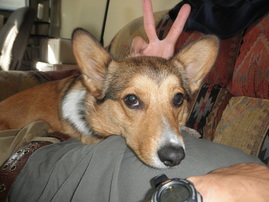 Not a poodle. Not a poodle. Husband, leaving for work: "I'm off to save the world." The Dog: *whines* Me: "This dog appreciates it. He doesn't want to be a post-apocalyptic dog." Husband: "Yeah, he doesn't look good in spikes. He's not tough enough to hang with the other post-apocalyptic dogs." Me: "It's true. All the dogs you ever see in post-apocalyptic stories are, like, Pit Bulls and German Shepherds. You never hear about post-apocalyptic poodles." And so he went off to work, the dog eventually stopped whining, and I wrote "Post Apocalyptic Poodle." Charles Christian, the editor at Grievous Angel, bought the story because, as he says in his introduction to it, "I've a dachshund who came from a rescue charity but who I suspect is actually an alien in an unfortunate disguise." Everyone needs mirrors in fiction, even alien-eyed shorty dogs. I started to say just now that I try not to write apocalyptic stories, but my own publication list belies that claim. There's "The Bolt Tightener," where a seawall is the only thing keeping the monsters from their final victory; there's "Natural Selection," a maybe-it's-a-virus, maybe-it's-zombies survival struggle; there's "As Dust Rolls Toward the Mountain," a contemporary Cassandra retelling about an asteroid strike, there's "Breath Over the Mouth of a Bottle," where an unnatural snowstorm has engulfed the whole planet. So. I guess I do write the occasional apocalyptic story. But I'm a little tired of them, to be honest, which is why it was easy to for me to satirize the genre in "Post Apocalyptic Poodle." It seems to be impossible these days for writers to imagine a future that isn't an apocalypse or a dystopia. I'm very interested in the nascent Solarpunk subgenre, which challenges writers to imagine an optimistic future. Even most supposed solarpunk I've read is still dystopic or post-apocalyptic in nature. It's like the crash is so inevitable at this point that we can't even conceptualize of it not happening. Anyway. "Post Apocalyptic Poodle" is just over 500 words, and it's online to read for free. Give it a read, and then click through to see the other fun stories Grievous Angel has published. Post-apocalyptic Poodle has no master. She runs free in the ruins of her former master’s city. She ravages the Dumpsters, the roadside recycling, the industrial bins. Other survivors skulk around the alleyways and snarl at her. She rolls in mud until it cakes her hypoallergenic locks, positions sticks along her back like spikes, and snarls back. If you enjoy this story, check out my other "dog story," "Working Like a Dog," published in Bartleby Snopes.

At the 2014 MileHiCon, I went to a panel titled "So You Want to be in an Anthology." I expected this to be a discussion of how to find and submit to anthologies, tips for making it through the slush pile, maybe even methods for approaching anthology editors who don't hold open submissions sessions. There was a little bit of that, but what it turned out to be was an exclusive opportunity to submit to a charity anthology—the only ones allowed to submit to it were the people who attended the panel that day. The topic was "sidekicks": write a story in which the sidekick, rather than the hero, is the protagonist.
I was in town for MileHiCon, but I left the convention early because my dad had bought tickets for the Chihuly exhibit at the Denver Botanic Gardens. Chihuly is an artist who does elaborate large-scale glass sculptures such as the ones pictured here. They are often set up in parks, gardens, or historical monuments, working with the landscape to enhance the effect of the artwork. These glass sculptures were set up all through the Botanic Gardens, creating a beautiful and magical scene. In the visitor's center, they showed a documentary about the construction of these installations, and as I watched, I started thinking about the people who assist Chihuly in his wild, abstract creations. And then I realized that could be my "sidekick" protagonist: an artist's assistant (in space, of course). I keep a 6x4 notebook in my purse for just such flashes of inspiration, so I pulled it out and started scribbling notes. A few days after MileHiCon was over, I wrote out a first draft, and titled it "Regarding the Incident on the Yellow Planet." To the Ladies, Gentlemen and Non-binaries of the Interstellar Arts Council: Please, I can explain. I know it looks as though I am solely responsible for the sabotage of the largest royal art commission in the galaxy's history, and, well, that's partially true. But even villains must have their motivations, and I assure you, I am not the villain of this story. By the time you read this message, I will no longer be at the address of its origin. Oskar taught me well the importance of leaving no fingerprints behind.
The story was accepted into the anthology, and I was able to meet with a number of the other contributors at the 2015 MileHiCon to sign each others' books. For many of the contributors, this was their first published story. It was something like my 40th, but it's one of the more fun publication experiences I've had. Even better, each sale of Sidekicks in either ebook or paperback goes to benefit MileHiCon, an absolutely wonderful small science fiction and fantasy convention that I haven't missed a year of since I discovered it.
 I took as many classes from Stephen Graham Jones as I could while I was at CU Boulder. Though probably best known for his new novel Mongrels, Stephen has a ridiculously long list of short fiction publications, many of which are very short flash or experimental pieces. One night I went to a faculty reading, where he shared a brilliant little flash story, and admitted afterward that he had written it during the commercial break while watching Star Trek. After his section of the reading was over, he sat in the back of the room and scribbled a brand new story while one of the other professors read. As a graduate student trying to balance classes, teaching, writing, and life, it was both frustrating and inspirational to see how he could squeeze writing in anytime and anywhere. So I decided to write a story on my bus ride home from that faculty reading. I would start it as soon as I sat down on the bus, and make sure I wrapped it up before my stop. “It Pours” is that story. This was still during the time when I was mostly using idiomatic expressions as prompts for stories (see my “Working Like a Dog” post for more on this), and so this title comes from the phrase “When it rains, it pours.” The first drops fell before I noticed the clouds that had gathered in the corner of my bedroom. I heard them, a slow drip that I attributed to a leaky faucet, or to an overflowing bathtub from the upstairs neighbors that I heard fighting all the time. But when I dragged my eyes up to the ceiling, straining, my whole face pulled by the effort of it, I saw the cumulus bunched into the corner like a clump of dust. I watched it spread across my ceiling. Drops plunked on pant legs, dripped off my arms. I laid straight as a corpse on the bed and let it happen, until every inch was soaked.  A few months after "It Pours" appeared in The Cafe Irreal, I investigated a strange URL that was sending traffic to my website, and discovered that someone had translated this story into Vietnamese and posted it on some kind of Vietnamese online magazine. I know unauthorized translations are a big problem for some writers, but considering that I was paid a token amount for the original, and the Vietnamese site was nice enough to include my bio and link to my website, I couldn’t really complain. Google Translate tells me the way they translated the title meant “Rain in the Room.” I’ve lost the link now, or maybe they’ve taken it down, but it was kind of fun to know that this strange magic realist story I wrote on a bus ride found a few fans in an unexpected place. I often think that I need long hours and perfect conditions to get any writing done, but I need to remember one of Stephen Graham Jones' biggest lessons: there are dozens of pauses in each day that could be filled with words.  I promised you gratuitous corgi pictures, didn’t I? Well, here we go. Although, since this is a story about a corgi, they’re not really that gratuitous. “Working Like a Dog” is another absurdist story — I was really into that for a while, and maybe it’s what I’m better at than straight-up fantasy and science fiction. For some reason, my husband and I used to make jokes about our corgi getting a job or helping out around the house, and one day I just took that joke and ran with it. I guess we joked one too many times about the dog getting a job; he finally did it. I stopped to get gas on the way home from the shop one day and there he was, wearing a little backwards uniform shirt and restocking the chip aisle in the convenience store. My wife said he'd seemed more tired than normal in the evenings, but we figured he'd just spent the day chasing squirrels out of the back yard.  I workshopped this story along with a couple of other flash fiction pieces in the first semester of my MFA. I don’t remember the original title, but I know it was fellow corgi owner and kickass writer C.T. Hutt who told me regarding the title, “the corgi puns practically write themselves.” So I ended up with “Working Like a Dog.” This actually inspired a whole series of stories that took common idiomatic sayings and considered them literally: “Son of a Gun,” “Brain Child,” “Take it With You to the Grave,” and “Cry Me a River” (which became “The Riverhead”), as well as a handful of others that were written but never published.  “Working Like a Dog” is probably the only story I’ve ever submitted for publication that was accepted at the first place I sent it to, and I chose that magazine because I knew it was a perfect fit. Not only because I’d read a number of other stories they’d published, but because I’d read a number of stories by the editor, Nathaniel Tower, and knew that he wrote with a similar surreal, absurd aesthetic. Could it have been published somewhere else, perhaps at a higher-paying market? Maybe. We’ll never know. But I said, “This is a Bartleby Snopes story,” and indeed, it was. (Now if only that would come true the next time I’m sure “This is a Clarkesworld story” or “This is a Beneath Ceaseless Skies story.” But it’s a tough market out there, especially at the pro level.) This story is absurd and humorous, but like many good absurdist works, it has a societal critique and a sadness at its core. This is a story that comes out of having just lived through the 2008 financial crisis, of four-dollar-per-gallon gas prices, of fear and uncertainty about the future. But all that’s softened and wrapped up in a nice ball of corgi fluff. “Working Like a Dog” is online and free to read at Bartleby Snopes, and it’s flash fiction at about 800 words — only slightly longer than this blog post. Give it a read sometime, and let me know if it made you laugh. 
My story "Fun(draising) with Meteoroids" is an absurdist science fiction story told in epistolary format: a series of letters and emails between a NASA representative and an average Joe. This story appeared in the anthology Dear Robot: An Anthology of Epistolary Science Fiction, edited by Kelly Ann Jacobson, which is available in paperback via Amazon. My Clarion classmate, and all-around awesome guy, Zach Lisabeth did quite a thoughtful analysis of the story on his blog.
The seed of this story was its absurd central conceit. The main character, Chad, receives a package containing a meteoroid (which he calls a “space rock”) along with a letter from NASA informing him that this particular meteoroid would have struck his house if NASA hadn’t plucked it out of the sky as part of their new-and-improved Near Earth Object program (which in real life watches the skies for catastrophic asteroids). But they aren’t just saving peoples’ houses as a civic duty; they want money. Below, you will find a donation form and a return label. Please, if you would like to keep the meteoroid, send a check to the address below for any amount you are able. All donations will assist the Near Earth Object program in its continued efforts to monitor and remove dangerous objects before they impact Earth. If you are unable to make a donation, or prefer not to keep the meteoroid, simply affix the return label to the box and take it to any USPS drop-off location. 
I came up with this concept while taking a class during my MFA about Russian Absurdist Literature, most likely around the time we read Omon Ra by Victor Pelevin, a Kafka-esque satire of the Soviet cosmonaut initiative. I had a premise, but not a story around it, and so I chewed on the idea for a few months before I actually tried to write anything.
In the summer of 2013, I had the opportunity to travel to Lithuania as part of the Summer Literary Seminars, an amazing program that’s half writing workshop, half cultural immersion. My group was only six people, and we workshopped three stories per person over the two weeks we were there. One of mine was the original draft of "Fun(draising) With Meteoroids," titled “Falling Star.” It went over okay in workshop — the teacher, at least, thought the absurd concept was hilarious — but they picked it apart like a good workshop should do, and one woman even took rather serious offense to a bit of the character arc that I had taken for granted. Usually after a workshop I will carefully consider the critique notes, highlight what makes sense, scratch out what doesn’t, and then revise the story accordingly. But after this one, I just didn’t know how to deal with it. I left the story alone for about two years. When I saw the submission call for Kelly Ann Jacobson’s Dear Robot anthology, the missing puzzle piece fell into place. The draft I had workshopped started with a letter, but the rest of the story followed a traditional first person narrator. What if I did the whole thing in epistolary style? What made this work, I think, is the dynamic that develops between the average Joe who’s pissed off that NASA claims he owes them his life, and the NASA representative who’s frustrated with the depths NASA has sunk to after having been turned into a for-profit private business. Listen, I get it. To be honest, I fought against this campaign, and so far we haven’t received a single positive response. I knew it was a bad idea when the memo was titled “Fun(draising) with Meteoroids.” I was just impressed they got the term “meteoroid” right.
Kelly was nice enough to accept this new version for her epistolary science fiction anthology, and she created a good-looking book that I’m thrilled to have on my brag shelf. The other stories in the table of contents are innovative, insightful, and fantastically written.
If you’ve read this anthology, won’t you please leave it an Amazon review? I’d love to hear what you thought about these epistolary science fiction stories. |
Archives
January 2024
Categories
All
|
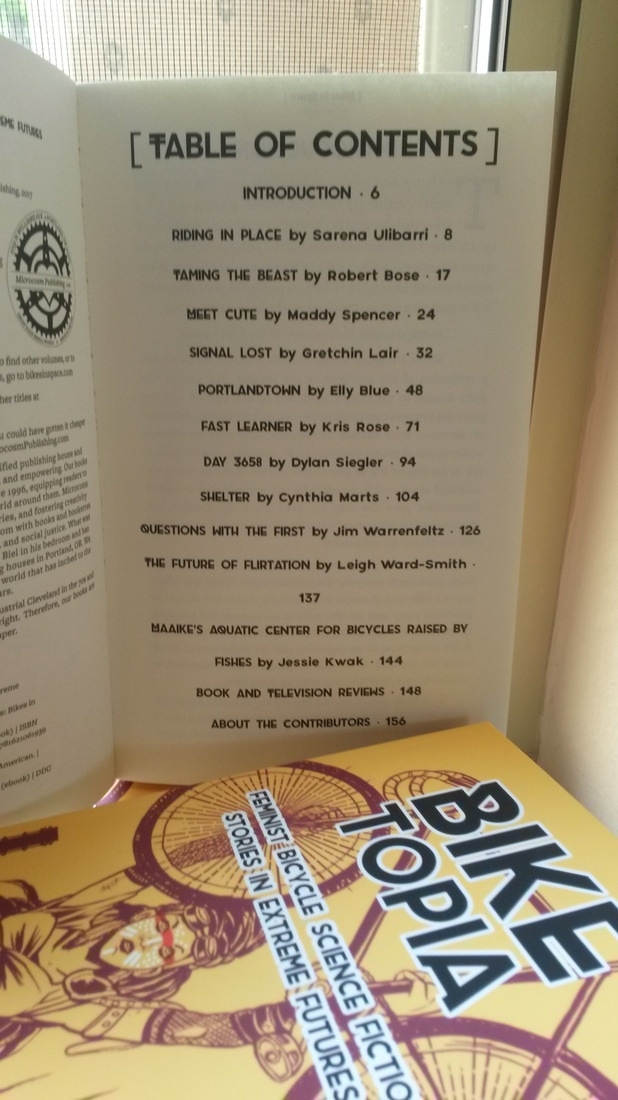
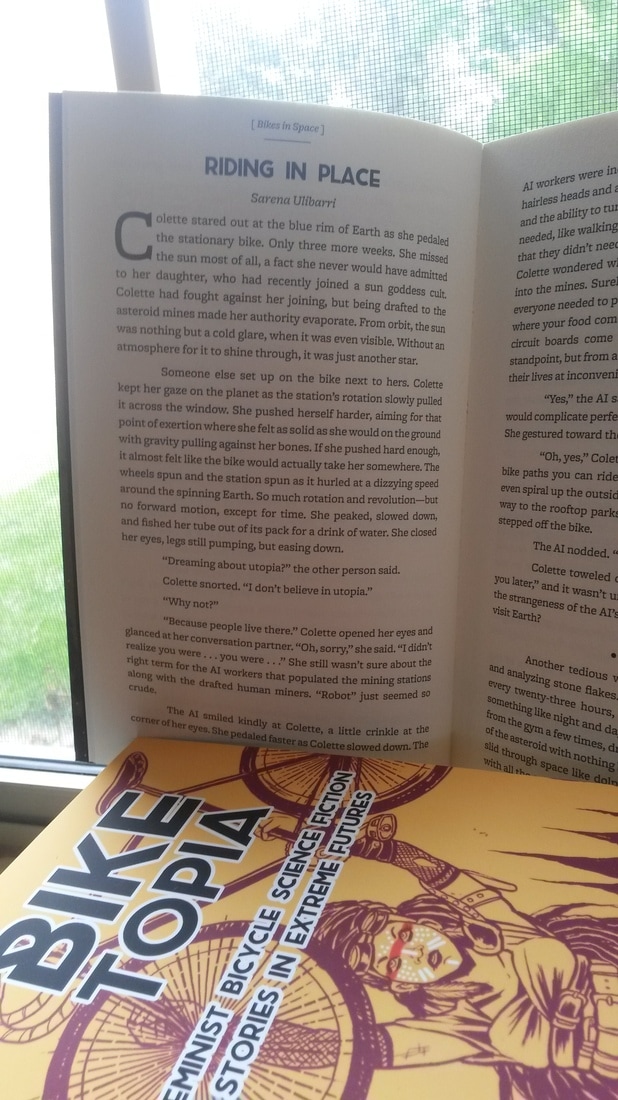

 RSS Feed
RSS Feed